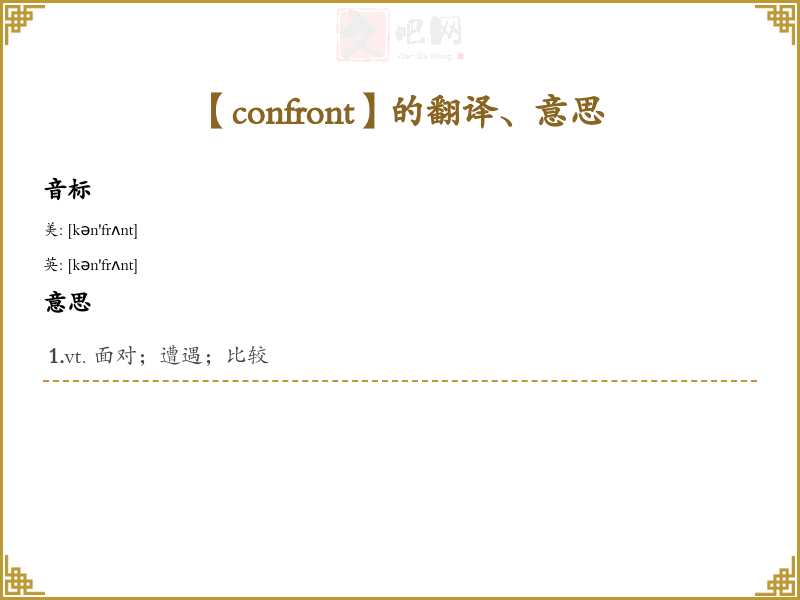【confront】的翻译、意思
时间: 2025-04-26 13:51:00
【confront】怎么读
美:[kən'frʌnt]
英:[kən'frʌnt]
【confront】是什么意思、字义解释
1. vt. 面对;遭遇;比较
【confront】的详细解释
英文单词学*与分析:[confront]
1. 基本定义
- 字面意思:"Confront" 的字面含义是“面对”或“对抗”,用于描述在某种情况下直接面对某人或某事。
- 定义:作为动词,"confront" 意指“直面某人或某事,尤其是当这种情况是困难的或具有挑战性的时”。
2. 词源与起源
-
词源分析:该词源自拉丁语 "confrontare",由 "con-"(意为“共同”)和 "frontare"(意为“面对”)组成。这个词根的组合表明与某人或某事的直接接触。
-
历史背景:该词首次记录在英语中出现在14世纪,最初用于描述面对面地处理问题或冲突的情境。
-
课本:在*的中学英语教材中,"confront" 可能出现在高年级的阅读理解或词汇练中。在牛津和美国的英语教材中,通常出现在高中或大学的语言课程中,特别是在讨论社会问题或个人发展时。
3. 使用场景
-
正式与非正式语境:
- 正式:在学术论文、法律文书或商务报告中,"confront" 常用于描述面对问题或挑战的策略。
- 例如:“The company had to confront the ethical implications of its practices.”(公司必须面对其做法的伦理影响。)
- 非正式:在日常对话中,人们可能会用这个词来表达对某人或某事的不满或挑战。
- 例如:“I confronted my friend about the lie.”(我向我的朋友面对谎言。)
-
特殊场合:
- 法律:在法律领域,"confront" 通常涉及当事人面临指控或在法庭上面对证人。
- 科学:在科学讨论中,可能用来描述直接面对挑战或实验结果。
- 例如:“Researchers must confront the limitations of their study.”(研究人员必须面对其研究的局限性。)
4. 示例句子
-
I had to confront my fears before giving the presentation.
我必须在做演讲之前面对我的恐惧。 -
The activists confronted the government about environmental policies.
活动家们向政府质询环保政策。 -
She confronted her teacher about the unfair grading.
她向老师提出了关于不公正评分的问题。 -
They confronted the issue head-on instead of avoiding it.
他们直面问题,而不是逃避它。 -
He was confronted by his past mistakes during the therapy session.
在治疗会议中,他被自己过去的错误所面对。
5. 同义词与反义词
-
同义词:
- Face:强调面对的动作,但不一定包含对抗的含义。
- Challenge:侧重于挑战的性质,而不仅仅是面对。
-
反义词:
- Avoid:意指逃避或不面对问题,强调回避的行为。
- Ignore:指不理会某人或某事,强调漠视的态度。
. 学方法
选择 音标记忆法:
- 音标:/kənˈfrʌnt/
- 通过分解音节,进行重复练*,帮助记忆发音和拼写。
选择 词根记忆法:
- "Con-" 意为“共同”或“一起”,"front" 意为“前面”或“面对”,联想成“共同面对”。
7. 关联词汇
- Confrontation(对抗)
- Confrontational(对抗性的)
- Confronting(面对的)
- Face(面对)
- Challenge(挑战)
通过以上的分析和学*方法,可以更好地理解和掌握 "confront" 这个单词的含义和用法。
【confront】例句
1、[V-T] If you are confronted with a problem, task, or difficulty, you have to deal with it. 面临 (问题、任务、困难等)
-
例:She was confronted with severe money problems.她面临严重的资金问题。
2、[V-T] If you confront a difficult situation or issue, you accept the fact that it exists and try to deal with it. 正视 (困难局面或问题)
-
例:We are learning how to confront death.我们在学习如何正视死亡。
3、[[usu passive]] If you are confronted by something that you find threatening or difficult to deal with, it is there in front of you. 面对 (有威胁或难处理的事物)
-
例:I was confronted with an array of knobs, levers, and switches.我面对着一排旋钮、控制杆和开关。
4、[V-T] If you confront someone, you stand or sit in front of them, especially when you are going to fight, argue, or compete with them. 与 (某人) 对峙 (尤指准备打斗、争论或竞争)
-
例:She pushed her way through the mob and confronted him face to face.她从那群暴民中挤出来,与他当面对峙。
-
例:They don't hesitate to open fire when confronted by police.他们一旦遭遇警察就毫不犹豫地开火。
5、[V-T] If you confront someone with something, you present facts or evidence to them in order to accuse them of something or force them to deal with a situation. (以某事物) 与 (某人) 对质
-
例:She had decided to confront Kathryn with the truth.她已决定用事实与凯瑟琳对质。
-
例:I could not bring myself to confront him about it.我不能就此事让自己与他对质。
